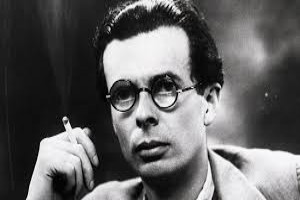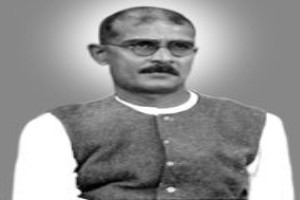
 By Mahadev Desai*
By Mahadev Desai*
(February 19, 1938)
Prof. Aldous Huxley has given a noble book to the pacifist world, a book which has come into our hands appropriately during this Congress week. Prof. Huxley’s is a sober and carefully detailed inquiry into the nature of our ideals and into the methods employed for their realization. He has called his inquiry “Ends and Means” a most appropriate title—and has scientifically proved that pure and noble ends make it imperative to employ pure and noble means. Almost in the language of the Gita—the author says that non-attachment is the only ideal, and “the practice of non-attachment entails the practice of all the virtues. It entails the practice of charity, for example; … it entails the practice of courage; … it entails the cultivation of intelligence; … it entails the practice of generosity and disinterestedness; ”—almost all the virtues to be practised by the man of the godly temperament described by the Gita in the sixteenth discourse.
Also read: History Recalled: British and American Nazism
From this point of view he has examined the existing methods of the organisation of our society, of government, of the administration of justice, of education, of religious practice, and of achieving social and political reform. “Real progress,” he says, quoting the words of Dr. R. R. Marett, “is progress in charity, all other advances being secondary thereto,” and he would correlate even the well-known virtues to the sovereign virtue of charity. The thorough¬going way with which Prof. Huxley has gone into the subject will be apparent from his observations on Chastity as a virtue:
“Chastity is one of the major virtues, as without chastity societies lack energy and individuals are condemned to perpetual unawareness, attachment and animality. In another sense, how¬ever, chastity can rank only as a minor virtue; for, along with such other minor virtues as courage, prudence, temperance and the like, it can be used solely as a means for increasing the efficiency of evil-doing. Unless they are directed by the major virtues of love and intelligence, the minor virtues are not virtues at all, but aids to wickedness…Chastity is not necessarily correlated with charity, on the contrary, the human organism is so constituted that there would seem to be a natural correlation between compulsory continence and energy that is malevolent at least as often as it is benevolent.”
So far as we are concerned, we have chosen the ends and we have determined the means. But there is a section amongst us that would re-¬examine the means and even alter them. They themselves do not claim that their ends are different from ours. Lenin who lived an ascetic life of self-effacement made not only the ends but even the means to look almost the same as ours. He sanctioned violent means no doubt, but he looked forward to a state of society which would be free from “every organized and systematic violence against man in general,” i.e. not only of exploitation of the masses by the classes but also of the exploitation of any single man by another. If that indeed is the goal, can it be achieved by any means other than those that make for peace? Prof. Huxley leaves no manner of doubt on the question. He takes as the text of one of his Chapters B. de Ligt’s dictum, ‘the more violence, the less revolution,’ and says:
“To be regarded as successful, a revolution must be the achievement of something new. But violence and the effects of violence—counter-violence, suspicion and resentment on the part of the victims and the creation, among the perpetrators, of a tendency to use more violence — are things only too familiar, too hopelessly un-revolutionary. A violent revolution cannot achieve anything except the inevitable results of violence, which are as old as the hills…We insist that ends which we believe to be good can justify means which we know quite certainly to be abominable, we go on believing, against all the evidence, that these bad means can achieve the good ends we desire. The extent to which even highly intelligent people can deceive themselves in this matter is well illustrated by the following words from Prof. Laski’s little book on Communism. ‘It is patent,’ he writes, ‘that without the iron dictatorship of the Jacobins, the republic would have been destroyed.’ To anyone who candidly considers the facts it seems even more patent that it was precisely because of the Jacobins that the republic was destroyed.”
But why not consolidate the results of violence argue some, by compensatory acts of non¬violence, i. e. of justice and goodwill, as Lenin apparently argued. ‘No,’ says Prof. Huxley, ‘it is in the nature of the case impossible – psychologically impossible, in other words:
For “a tradition of violence is formed; men come to accept a scale of values according to which acts of violence are reckoned heroic and virtuous…Violence, as we have seen, can produce only the effects of violence; these effects can be undone only by the compensatory non¬-violence after the event; where violence has been used for a long period, a habit of violence is formed and it becomes exceedingly difficult for the perpetrators of violence to reverse their policy. Moreover, the results of violence are far-reaching beyond the wildest dreams of the often well-intentioned people who resort to it. The ‘Iron dictatorship’ of the Jacobins resulted, as we have seen, in military tyranny, twenty years of war, conscription in perpetuity for the whole of Europe, the rise of nationalistic idolatry. In our own time the long-drawn violence of the World War produced the ‘iron dictatorship’ of the Bolsheviks, The threat of world-wide revolutionary violence begot. Fascism; Fascism produced rearmament; rearmament has entail¬ed the progressive deliberalization of the democratic countries. What the further results of Moscow’s ‘iron dictatorship’ will be time alone will show. At the present moment (June 1937) the out¬look is, to say the least of it, exceedingly gloomy.”
Prof. Huxley’s book should serve as a warning to us, though we really should have less need of the warning. In the West where Prof. Huxley has shown that violence has had its inevitable results of violence, the warning is badly needed. We have, in a world of violence, seen at least some results of non-violence. That is so much the more reason why we should steer clear of violence and make a nobler effort to attain our goal through the non-violent method.
*Mahadev Desai was an eminent freedom fighter and Mahatma Gandhi’s personal secretary; article courtesy his grandson, Nachiketa Desai.






you have an excellent weblog here! would you prefer to make some invite posts on my blog?
I was rattling happy to find this site on bing, just what I was searching for : D likewise bookmarked .
Youre so cool! I dont suppose Ive read anything such as this prior to. So nice to seek out somebody by incorporating original thoughts on this subject. realy we appreciate you starting this up. this excellent website is one area that is required over the internet, a person with a bit of originality. valuable work for bringing new things to the world wide web!
There are some interesting cut-off dates in this article but I don know if I see all of them center to heart. There is some validity however I will take maintain my opinion until I look into it further. Good article, thanks and we want extra! Added to FeedBurner as effectively
Glad to be one of many visitants on this awesome site : D.
I enjoy you because of all of your labor on this website. My mom really loves conducting internet research and it’s easy to understand why. I hear all relating to the powerful mode you offer advantageous tips on your blog and improve contribution from people on this theme so my simple princess is actually learning a great deal. Have fun with the rest of the year. You have been conducting a fantastic job.
I went over this site and I believe you have a lot of superb information, saved to bookmarks (:.
so much wonderful info on here, : D.
I am glad to be a visitor of this thoroughgoing website ! , appreciate it for this rare information! .
It’s rather a cool as well as beneficial little bit of information. I will be happy which you discussed this kind of useful information with us. Make sure you stop us current like this. Appreciate discussing.
Enjoyed reading through this, very good stuff, thankyou .
There couple of fascinating points at some point in this posting but I don’t determine if them all center to heart. There may be some validity but I’ll take hold opinion until I investigate it further. Excellent write-up , thanks and that we want much more! Added to FeedBurner also
I really appreciate articles on your site. You’re doing a fine job! Thanks a lot.
I impressed, I have to say. Really not often do I encounter a blog that each educative and entertaining, and let me inform you, you’ve hit the nail on the head. Your concept is outstanding; the difficulty is one thing that not sufficient individuals are speaking intelligently about. I’m very glad that I stumbled across this in my seek for something regarding this.
I’m so happy to read this. This is the kind of info that needs to be given and not the random misinformation that’s at the other blogs. Appreciate your sharing this greatest doc.
I would like to thnkx for the efforts you have put in writing this website. I’m hoping the same high-grade web site post from you in the upcoming as well. In fact your creative writing abilities has encouraged me to get my own site now. Actually the blogging is spreading its wings quickly. Your write up is a great example of it.
Some genuinely nice and useful info on this internet site , besides I believe the pattern has got good features.
Usually I do not read post on blogs, but I wish to say that this write-up very pressured me to take a look at and do it! Your writing style has amazed me. Thanks, very nice post.
I just added this web site to my google reader, great stuff. Can’t get enough!
I came across your blog internet site on google and check a few of your earlier posts. Continue to keep up the extremely good operate. I just additional up your RSS feed to my Windows live messenger News Reader. Seeking toward reading much more from you afterwards!?-
Awesome blog man! Has a great feel to it Hope you keep updating and make people like me visit! It’ll be in my bookmarks so better update!
Your blog never ceases to amaze me, it is very well written and organized.~`’-:
You should join in a tournament for just one of the best blogs on the web. I’ll recommend this great site!
Sweet blog! I found it while searching on Yahoo News. Appreciate it
There is so much in this article that I would never have thought of on my own. Your content gives readers things to think about in an interesting way. Thank you for your clear information.
Well done. I i never thought I would personally accept as true with this opinion, but I’m commencing to view things at a different view. I must research more about this simply because it seems fascinating. Another thing I don???t understand though is the way things are all related together.
woah i like yur site. It really helped me with the information i wus looking for. thank you, will save.
This web site is my aspiration , rattling superb pattern and perfect content material .
I had been honored to receive a call coming from a friend as he observed the important points shared in your site. Looking at your blog publication is a real great experience. Thank you for thinking of readers like me, and I desire for you the best of achievements for a professional surface area. resorts in cuba
I just wanted to write down a quick comment to say thanks to you for all of the fantastic suggestions you are showing on this site. My time intensive internet look up has at the end been rewarded with useful points to talk about with my visitors. I would assume that most of us visitors actually are very much blessed to live in a fantastic network with many outstanding professionals with insightful strategies. I feel pretty grateful to have come across your entire web page and look forward to some more excellent moments reading here. Thanks a lot once more for everything.
I went over this website and I conceive you have a lot of great information, saved to fav (:.
The thing i like about your blog is that you always post direct to the point info.
this is something i have never ever read.